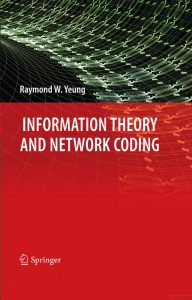
- Table of Contents
- e-book
(Free with institutional subscription) - Hardcopy
- Slides
- MOOC
- IHP Short Course:
Shannon’s Information Measures and Markov Structures:
Part 1
Part 2
Part 3 - Book Reviews
- Errata
- ITIP
- Network Coding Wiki
- IEEE Information Theory Society
Information Theory and Network Coding
by Raymond W. Yeung, The Chinese University of Hong Kong
Springer, August 2008, 604 pp., US$ 64.95, ISBN 978-0-387-79233-0
Information Theory and Network Coding consists of two parts: Components of Information Theory and Fundamentals of Network Coding Theory. Part I is a rigorous treatment of information theory for discrete and continuous systems. In addition to the classical topics, there are such modern topics as the I-Measure, Shannon-type and non-Shannon-type information inequalities, and a fundamental relation between entropy and group theory. With information theory as the foundation, Part II is a comprehensive treatment of network coding theory with detailed discussions on linear network codes, convolutional network codes, and multi-source network coding.
Other important features include:
- Derivations that are from the first principle
- A large number of examples throughout the book
- Many original exercise problems
- Easy-to-use chapter summaries
- Two parts that can be used separately or together for a comprehensive course
Information Theory and Network Coding is intended for senior undergraduate and graduate students in electrical engineering, computer science, and applied mathematics. The book can also be used as a reference for professional engineers in the area of communications.
Besides The Chinese University of Hong Kong, this book and its predecessor have been used as a textbook at
Univ of Akron, Univ of Belgrade, Ben-Gurion U, Bu-Ali Sina U, UC Berkeley, UC San Diego, UC Santa Barbra, UC Santa Cruz, Caltech, China Agricultural U, Columbia, COMSATS Institute of Technology, Cornell, Tech Univ of Crete, Dresden University of Technology, Drexel Univ, Univ of Electronic Science and Technology of China, Ferdowsi Univ of Mashhad, Gazi Univ, Univ of Illinois at Urbana-Champaign, Indian Institute of Tech Guwahati, Iowa State Univ, Isfahan Univ of Technology, Kansas State Univ, Univ Federal de Minas Gerais, Univ of Massachusetts Amherst, King Mongkut’s Univ of Technolgy, KTH Royal Institute of Technology, Louisiana State Univ, Malek Ashtar Univ of Technology,Univ of Maryland, Baltimore County, Univ of Massachusetts Amherst, Michigan State Univ, Univ of Nebraska-Lincoln, National Chiao Tung Univ, National Institute of Tech Warangal, National Taiwan Univ of Science and Technology, Sir Syed CASE Institute of Technology Islamabad, Technische Universitt Mnchen, Univ of Peloponnese, Occidental College, PES Univ, Univ of Porto, Purdue Univ, RWTH Aachen Univ, S.R.M. Inst. of Sc. & Technology, ShanghaiTech Univ, Univ of South Australia, Syracuse Univ, Univ of Tehran, Univ of Thessaly, Texas A&M, Univ of Turin, Polytechnic U of Tirana, Tsinghua Univ, Univ of Victoria, Univ of Washington, and Univ of Western Ontario
and as a reference book at
Air Univ, Bhagwant Univ, UC Irvine, UC Riverside, Univ of Cape Town, Univ of Central Florida, Chalmers Asia, Univ of Copenhagen, Delft Univ of Tech, Technische Universitt Dresden, Centro de Estudos em Telecomunicaes, ETH, Univ of Geneva, Germany U in Cairo, Imperial College, Univ of Incheon, Information and Communications University, International Institute of Information Technology, Univ of Isfahan, Univ of Kansas, Lahore Univ of Management Sciences, Linkping Institute of Technology, MIT, Univ of Madeira, McGill Univ, Univ of Melbourne, Univ of Minnesota, Missouri Univ of Science of Tech, Univ of Mumbai, Nanyang Technological Univ, National Taiwan Ocean Univ, National Taiwan Univ, National Tsing Hua Univ, New Jersey Institute of Tech, New Mexico State Univ, Northeastern Univ, Univ of Notre Dame, Univ of Novi Sad, Univ of Oklahoma, Univ of Pittsburg, Pohang Univ of Science & Tech, Queen’s Univ, National Institute of Tech Raipur, Univ of Rochester, Shanghai Jiao Tong Univ, Sharif Univ of Tech, Simon Fraser University, South Methodist Univ, Stanford, Tata Institute of Fundamental Research, Instituto Tecnolgico de Aeronutica, Univ of Toronto, Univ of Virginia, Worcester Polytechnic Institute, Xidian Univ, and Yuan Ze Univ.
The book has also been used for the MOOC on Information Theory offered by the author (Coursera, Spring 2014).
Solution manual available to course instructors upon request. Please contact the author. The author acknowledges the generous support of a research award from the Alexander von Humboldt Foundation in 2007 during which this book was written.